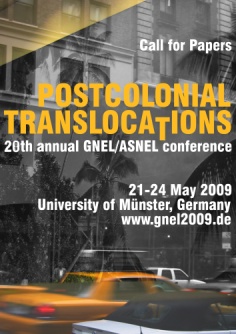Call for papers

C.F.P. Postcolonial Translocations
20th annual GNEL / ASNEL Conference
University of Münster, Germany
21 - 24 May 2009
The second call for papers has closed on February 6, 2009.
Cultural
products emerge from ever more shifting grounds, and translocation is becoming
increasingly significant: narrative fiction, poetry, drama, and film are
created with a view to being marketed in several languages and markets; authors
and producers move from one country to another; global audiences consume
cultural products in different locales, creating demands in several marketplaces;
national borders are fought over and redrawn, materially as well as textually,
further undermining any sense of a stable location.
Translocation
denotes more than a simple ‘change of location’ or ‘dislocation’ (which often
implies a privileging of ‘origins’ over ‘new’ locations), because this concept
can leave open points of departure and destination. Translocation is not only a
process (the transfer of people, cultural products, borders), but can also mean
a new kind of location, a trans-location consisting of fractured and variously
connected spaces.
Postcolonialists
read contemporary and historical texts across disparate geographic and temporal
spaces. In the context of globalisation and neo-imperialisms, not only unequal
development and political instability but also violence and gender inequality
continue to shape complex postcolonial realities; nation and narration, place
and displacement, location and migration remain major paradigms of postcolonial
critique. The postcolonial lexicon clearly indicates our concern with
placement, movement and interconnection. But arguably our understanding of what
constitutes a specific location has dramatically changed over the last few
decades and requires reading practices which reflect the communicative, political
and aesthetic concerns of translocal representation. The
growing
body of texts which – linguistically, aesthetically, and thematically – draw on
and combine distinct cultural repertoires is an indication of the increasing
relevance of postcolonial translocations today.
Under the sign of translocation, this conference promotes a critical evaluation of postcolonial texts and media whilst also investigating their institutional academic contexts. Possible topics for papers and panels include
In addition to panels and papers in the traditional format, we also offer two forums for the discussion of research projects at an earlier stage of development:
Proposals are still accepted for both. For more information please follow these links or contact Dr. Ursula Kluwick: ursula.kluwick@ens.unibe.ch |
- Cosmopolitan Film Cultures (Markus Heide)
- Translocating Cosmopolitanism (Virginia Richter, Frank Schulze-Engler)
- Contact varieties translocated: language and identity in Diaspora communities (Susanne Mühleisen, Anne Schröder)
- 'Translocation' as Topos in Literatures and Films from/on Southern Africa (Monika Reif-Hülser)
- Translocating postcolonial studies: Interdisciplinary developments (round table) (Christine Vogt-William, Silke Stroh)
- Black British Translocations
- Border regimes and border-crossings
- Imagining
translocal space
- Representations
of forced and voluntary relocations (incl.
slavery, indentureship, transportation, migration)
- Postcolonial
cultural transformations
- Authority
and authenticity in postcolonial texts
- Transmigration
- Translation
and translocation
- Translocal
food and its representations
- Moving
species: Biological transfers
- Online
writing, online reading
- Cyber
diasporas
- Diaspora
literature
- Travel
writing
- Academic
locations and reallocations of Postcolonial Studies
- 20 years
on: GNEL/ASNEL and its institutional locations
You can
email abstracts of papers (20 minutes) or proposals for panels comprising three
papers (90 minutes) to the following address: gnel2009@gmail.com
Abstract length: about 200 words
Panel descriptions: about 600 words
Please also send information about your position, academic location, contact details, and some short biographical information (max. 100 words).

